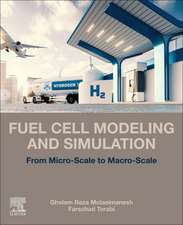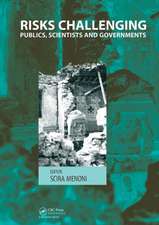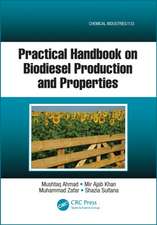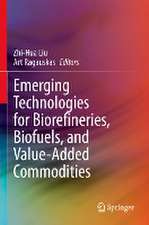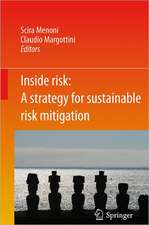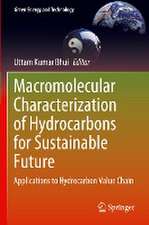Peri-Urban Areas and Food-Energy-Water Nexus: Sustainability and Resilience Strategies in the Age of Climate Change: Springer Tracts in Civil Engineering
Editat de Angela Colucci, Marcello Magoni, Scira Menonien Limba Engleză Paperback – 12 iun 2018
| Toate formatele și edițiile | Preț | Express |
|---|---|---|
| Paperback (1) | 634.18 lei 6-8 săpt. | |
| Springer International Publishing – 12 iun 2018 | 634.18 lei 6-8 săpt. | |
| Hardback (1) | 640.24 lei 6-8 săpt. | |
| Springer International Publishing – 18 aug 2016 | 640.24 lei 6-8 săpt. |
Din seria Springer Tracts in Civil Engineering
- 18%
 Preț: 1579.49 lei
Preț: 1579.49 lei - 18%
 Preț: 787.15 lei
Preț: 787.15 lei - 18%
 Preț: 956.03 lei
Preț: 956.03 lei - 18%
 Preț: 1234.00 lei
Preț: 1234.00 lei - 18%
 Preț: 1117.82 lei
Preț: 1117.82 lei - 15%
 Preț: 590.95 lei
Preț: 590.95 lei - 20%
 Preț: 754.34 lei
Preț: 754.34 lei - 15%
 Preț: 645.79 lei
Preț: 645.79 lei - 18%
 Preț: 1122.56 lei
Preț: 1122.56 lei - 18%
 Preț: 726.37 lei
Preț: 726.37 lei -
 Preț: 256.15 lei
Preț: 256.15 lei - 18%
 Preț: 1120.99 lei
Preț: 1120.99 lei - 15%
 Preț: 595.86 lei
Preț: 595.86 lei - 18%
 Preț: 1119.38 lei
Preț: 1119.38 lei - 18%
 Preț: 1121.55 lei
Preț: 1121.55 lei - 18%
 Preț: 1614.21 lei
Preț: 1614.21 lei - 18%
 Preț: 1002.75 lei
Preț: 1002.75 lei - 15%
 Preț: 640.24 lei
Preț: 640.24 lei - 18%
 Preț: 954.62 lei
Preț: 954.62 lei - 18%
 Preț: 1113.71 lei
Preț: 1113.71 lei - 18%
 Preț: 948.47 lei
Preț: 948.47 lei - 15%
 Preț: 645.47 lei
Preț: 645.47 lei - 15%
 Preț: 667.86 lei
Preț: 667.86 lei - 18%
 Preț: 1225.31 lei
Preț: 1225.31 lei - 18%
 Preț: 975.92 lei
Preț: 975.92 lei - 18%
 Preț: 960.42 lei
Preț: 960.42 lei - 18%
 Preț: 947.04 lei
Preț: 947.04 lei - 18%
 Preț: 1024.08 lei
Preț: 1024.08 lei - 15%
 Preț: 643.48 lei
Preț: 643.48 lei - 15%
 Preț: 636.45 lei
Preț: 636.45 lei - 18%
 Preț: 1119.24 lei
Preț: 1119.24 lei - 18%
 Preț: 1383.00 lei
Preț: 1383.00 lei - 15%
 Preț: 597.26 lei
Preț: 597.26 lei - 18%
 Preț: 1003.70 lei
Preț: 1003.70 lei - 18%
 Preț: 1416.12 lei
Preț: 1416.12 lei - 18%
 Preț: 1012.84 lei
Preț: 1012.84 lei - 15%
 Preț: 586.05 lei
Preț: 586.05 lei - 18%
 Preț: 1241.25 lei
Preț: 1241.25 lei - 15%
 Preț: 606.82 lei
Preț: 606.82 lei - 15%
 Preț: 581.65 lei
Preț: 581.65 lei - 15%
 Preț: 522.56 lei
Preț: 522.56 lei - 18%
 Preț: 1025.79 lei
Preț: 1025.79 lei - 18%
 Preț: 944.82 lei
Preț: 944.82 lei - 18%
 Preț: 1408.71 lei
Preț: 1408.71 lei
Preț: 634.18 lei
Preț vechi: 746.09 lei
-15% Nou
Puncte Express: 951
Preț estimativ în valută:
121.37€ • 125.38$ • 101.01£
121.37€ • 125.38$ • 101.01£
Carte tipărită la comandă
Livrare economică 26 martie-09 aprilie
Preluare comenzi: 021 569.72.76
Specificații
ISBN-13: 9783319822433
ISBN-10: 3319822438
Ilustrații: X, 156 p. 24 illus.
Dimensiuni: 155 x 235 mm
Greutate: 0.25 kg
Ediția:Softcover reprint of the original 1st ed. 2017
Editura: Springer International Publishing
Colecția Springer
Seria Springer Tracts in Civil Engineering
Locul publicării:Cham, Switzerland
ISBN-10: 3319822438
Ilustrații: X, 156 p. 24 illus.
Dimensiuni: 155 x 235 mm
Greutate: 0.25 kg
Ediția:Softcover reprint of the original 1st ed. 2017
Editura: Springer International Publishing
Colecția Springer
Seria Springer Tracts in Civil Engineering
Locul publicării:Cham, Switzerland
Cuprins
Climate policies and strategies in the European Union.- Nexus approach to Disaster Risk Reduction, Climate Adaptation and Ecosystem Management: new paths for a Sustainable and Resilient Urban Development.- Function and values of peri-urban areas: a multifunctional perspective from the EU to Lombardy Region policies.- Urban-rural partnerships and governance of peri-urban areas in a European perspective. Towards regenerative regions .- Qualifying decision-making through strategic environmental assessment: advancing the resilience of peri-urban areas.- Services, values and functions of peri-urban areas in a NEXUS approach.- NEXUS services from a territorial perspective: interactions and trade-offs.- Flood risk management and the nexus approach: a preliminary conceptual overview based on case studies.- NEXUS and disaster prevention: what can we learn from the Genevan urban area?.- Renaturalizing riverbanks and making space for the river: coupling ecological concerns and risk prevention measures.- Exploring the water-food-energy and climate nexus: insights from the Moroccan Draa Valley.- Peri-urban/peri-rural areas: identities, values and strategies.- Local food chain: multi-stakeholders polices in Dutch and European polices.- Urban-rural partnerships in peri-urban areas: the non-profit association role.- Between city and countryside: changing nexus in the urban phenomenon of Rome.- Energy flows in peri-urban areas.- Rethinking energies in peri-urban areas: potentiality and action criteria.- Strategies to reduce the use of fossil fuels in the Lombardy Region.- Bioregion and Eco-Efficiency.
Textul de pe ultima copertă
This book explores the nexus among food, energy and water in peri-urban areas, demonstrating how relevant this nexus is for environmental sustainability. In particular it examines the effective management of the nexus in the face of the risks and trade-offs of mitigation policies, and as a mean to create resilience to climate change. The book delineates strategies and actions necessary to develop and protect our natural resources and improve the functionality of the nexus, such as: integrated management of the major resources that characterize the metabolism of a city, stronger coordination among stakeholders who often weight differently the services that are relevant to their individual concerns, integration of efforts towards environmental protection, adaptation to and prevention of climate change and disaster risks mitigation.
Caracteristici
Explores adoption of a robust and widely applicable system and an integrated approach oriented to practical solutions to the problems considered Illustrates with examples many good practices and intervention criteria Brings together the diverse thoughts of an experienced group, thus exposing both the benefits and risks of a variety of possible systems and strategies Includes supplementary material: sn.pub/extras
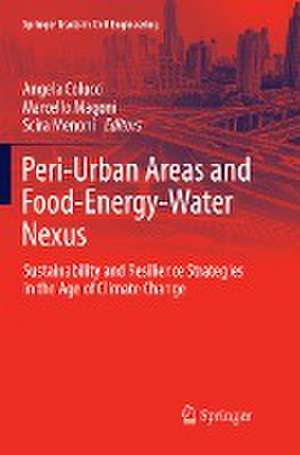
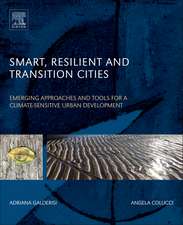
![[ECO]systems of Resilience Practices: Contributions for Sustainability and Climate Change Adaptation](https://i3.books-express.ro/bt/9780128191989/eco-systems-of-resilience-practices.jpg)
